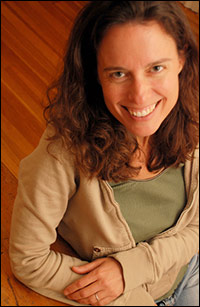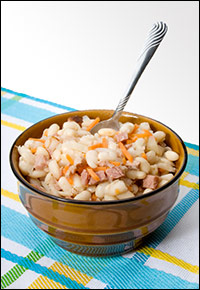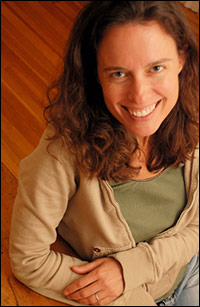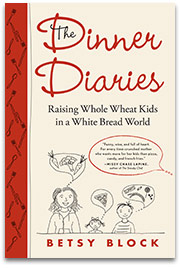In her new book The Dinner Diaries: Raising Whole Wheat Kids in a White Bread World, Betsy Block writes compellingly about trying to feed one’s family and oneself in a nutritious, sustainable, economical, and harmonious way — and dealing with various likes and dislikes within the family dining unit.

Betsy Block
Photo: Andrew Pockrose
I imagine reviewers will liken the experience of reading this book to sitting and talking at the kitchen table with a trusted friend, and they’ll be right. How do I know? Because Betsy is my trusted friend, and I am sitting at the kitchen table of her Boston-area home.
Well, that’s not entirely accurate. We’re standing, not sitting. Betsy is pouring me a giant glass of ice water (it’s only 10 a.m., and already it’s in the high 90s) and before we even sit down I start gushing about how much I love her book. I tell her that what I like most about it is that it takes place on a human scale. “You know how Google Earth has aerial views and street-level views?” I ask her. “Yes …,” she says slowly, wondering, I’m sure, where I am going with this. “Well, I often feel that advice about nutrition and child-rearing is delivered from on high, as remote as an aerial view, but your book takes place right in the trenches, at street level. In fact, the word ’embedded’ came to mind.”
“Thank you,” Betsy says softly. “That’s exactly what I was going for. I’m so glad it came across that way.”
“You know what else I liked about the book?” I say between sips. “It’s so real. The chapter on your attempt to keep a food diary of everything your family is eating, and how everything suddenly goes all to hell one day when Roxy has a stroke, is the way life really is.” (Roxy is their beloved mutt, and I am happy to report that she recovered from her stroke and met me at the gate this morning with her tail wagging.)
That provokes Betsy to bring up another messy situation portrayed in Dinner Diaries. Grinning devilishly, Betsy reminds me that the book tells the back story of an infamous soirée I had attended at her house (on a weeknight … how decadent … suburban moms gone wild!). “I bet you didn’t know about the lice infestation the week of the Girls, Greens, and Grains party!” Betsy laughs. I was amused to read of Betsy’s frantic efforts to delouse the house before her guests arrived for a party featuring recipes using grains that most of us didn’t grow up eating and greens that we should cook and eat more often. (I brought chocolate. I just can’t leave well enough alone.)
We discuss the territory the book covers: nutrition, ethical concerns about eating meat and fish, organic food, and family dining dynamics, in addition to chapters concerning vexing situations like people offering your kids things you’d rather they not eat, and children trading healthy homemade lunches with schoolmates for unhealthy choices.
One Step at a Time
Betsy devoted most of a year to doing exactly the kind of research that most people would like to do if only they had the time and resources. Not only does she share her research in clear and easily understood (as well as very entertaining) prose, but she also describes the walls she runs into, either in terms of inadequate information, conflicting opinions, or unrealistic suggestions.
I ask Betsy whether changes in the way we eat can make a difference. “Yes! Absolutely!” she answers. She reminds me that, not long ago, consumers routinely bought canned tuna harvested in a way that harmed dolphins. Now, dolphin-safe tuna is ubiquitous. “That’s an entirely consumer-driven change,” Betsy says. “Our actions do matter.”
We talk about how making changes seems like pure sacrifice — especially when we steer our diets away from what we’re used to, what we’re comfortable with, what we know we like. Betsy said that in her experience transforming her family’s diet, “there have been lots of sacrifices … and lots of gains too.” To lighten their ecological footprint, they’ve cut back on meat and seafood — but also made new discoveries, such as delicious greens and grains. “Our diet is much more diverse now, and we’re all more willing to try new things. Sometimes our experiments end in flaming failure … but lots of times they’re a hit.”
In the book’s opening, Betsy shows just how challenging the transformation was. All of the other members of her family are picky eaters — and they dislike different things. The lists of what her son and daughter refused to eat had me thinking, “That poor woman! How does she do it?” But her husband’s list was even longer. How does she do it?
Short answer: She takes it slow. “I started this meal makeover with a bang, immediately alienating all three beloved members of my family and increasing tension in the home,” she says. Chastened, she switched from giant steps to baby steps: “Taking it one step at a time and practicing more than I preach are both helpful.”
I ask her how she feels about raising children in an ecologically challenging time. “It might be contrary to common sense, but having kids has actually made me more joyful and hopeful about the future,” she says. And that joy and hope, in turn, inform her parenting. “I think that the most important thing that I can do for my kids is to live joyfully … and not fake joyful, but really joyful. How are we going to get to a lighter world on a dark path?”
As we wrap up our interview and prepare to go our separate ways, Betsy reflects on the message of the book. “What we eat matters for ourselves, for other people, and for the planet, and it doesn’t have to be a huge overhaul. A few small changes does it.”
Bob Sargent’s Bean Soup with Just a Little Pig
Bob Sargent owns Flora, a restaurant in Arlington, Mass. He gave this recipe to Betsy to use in her book.

Serves 4
2 cups diced onions
1 cup diced carrots
1 bunch green Swiss chard, washed and separated into stems and leaves; coarsely chop each and keep separate
1 or 2 links chorizo sausage, sliced thin
2 tablespoons minced garlic
Generous pinch of salt
Enough water or vegetable or chicken stock to cover the beans by an inch
1 pound navy beans, soaked overnight
Heat the oil gently in a three- or four-quart soup pot over medium heat. Add the onions, carrots, chard stems, and sausage. Cook until vegetables are slightly softened and fragrant, about 10 minutes. Add garlic and salt, and stir. Pour in the beans and enough water or stock to cover, plus 1 inch. Bring to a boil, then turn the heat down and cook at a lively simmer for 1 to 1 1/2 hours, or until the beans are as soft as you like, adding more liquid as needed. Toss in the chard greens, taste for seasoning, and cook until the greens are wilted. “We eat this with garlic bread and salad,” Betsy says.



